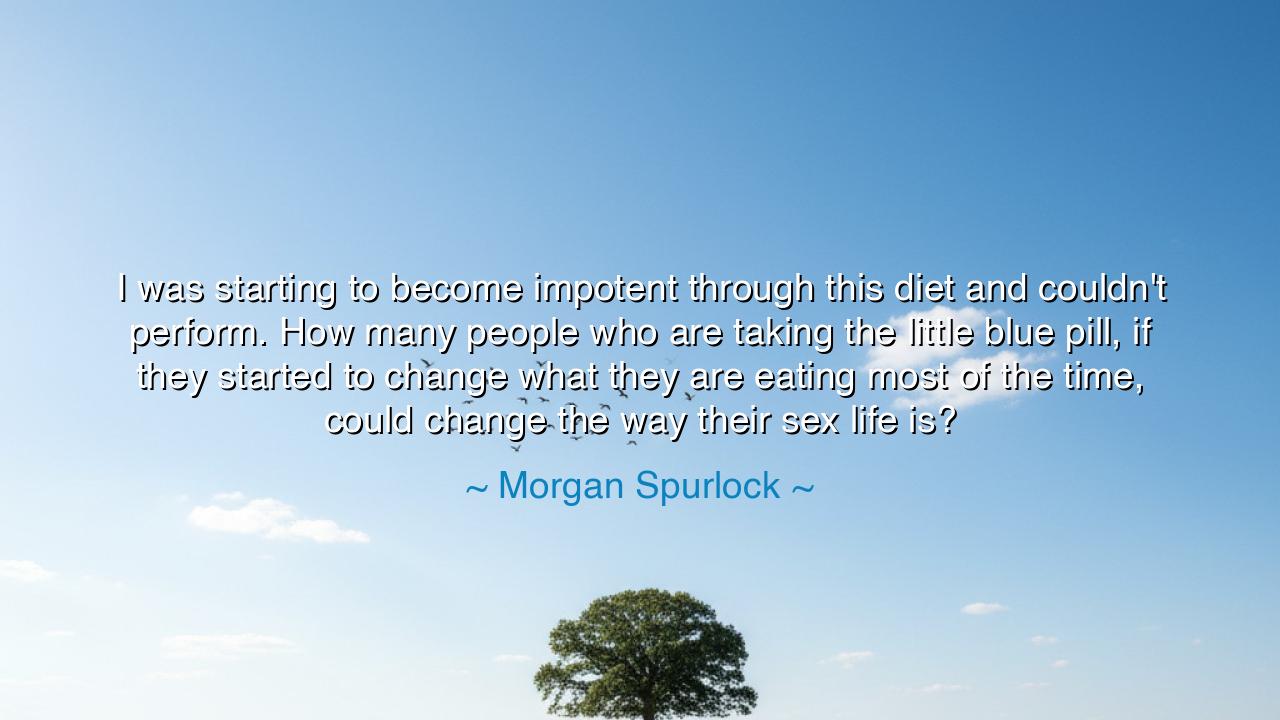
I was starting to become impotent through this diet and couldn't
I was starting to become impotent through this diet and couldn't perform. How many people who are taking the little blue pill, if they started to change what they are eating most of the time, could change the way their sex life is?






The words of Morgan Spurlock echo like a warning bell from the temple of the body, calling us to awaken from our slumber of indulgence and forgetfulness. In his confession — "I was starting to become impotent through this diet and couldn't perform. How many people who are taking the little blue pill, if they started to change what they are eating most of the time, could change the way their sex life is?" — we hear not merely a lament, but a revelation. He speaks as one who has walked through the valley of self-destruction and emerged wiser, bearing the scars of his own choices. The diet he refers to was not a path of nourishment but of decay — a regimen of processed foods and excess, of artificial pleasures that dulled the body’s sacred flame. From his suffering arose an insight as old as humanity itself: that what we eat is not merely sustenance, but spirit in substance.
In the age of plenty, mankind has become poor in wisdom. The ancients knew that the body is the temple of life’s energy — the vessel through which desire, creativity, and vitality flow. When we poison that temple with what is lifeless, we extinguish the very spark that animates us. Spurlock’s words came after his experiment in Super Size Me, where he ate nothing but fast food and watched his vigor wither. His confession of impotence was not only about the failing of the flesh, but the failure of harmony between man and nature. For he had violated a simple law: that every meal is a covenant between the eater and the Earth.
There is an ancient story from the East, of a warrior who, after many years of battle, sought to rekindle his strength. He was told by a hermit in the mountains: “The sword grows dull when the hand that holds it forgets the tree from which its handle was carved.” The warrior came to understand that his weakness was not born from age, but from neglect — neglect of the balance between what he took and what he gave. Likewise, in our time, countless men seek potency from pills, when what they truly need is a return to balance — to eat what is living, to move as nature intended, to let the heart remember its rhythm.
The little blue pill, Spurlock reminds us, is not salvation but illusion. It awakens the body for a moment, but not the soul. It gives the illusion of power without the root of strength. True vitality — the kind that burns long and bright — comes not from chemical trickery, but from the discipline of nourishment, the patience of self-care, and the humility to listen to one’s body. The ancients spoke of Chi, Prana, Life Force — words different in tongue but united in meaning. They knew that when food is pure, movement is honest, and the mind is still, the fire of life burns steady. Spurlock, though modern in form, touched this old wisdom through his pain.
The lesson is thus both simple and sacred: our diet shapes our destiny. A man who eats thoughtlessly becomes thoughtless in spirit. A woman who fills her body with processed comfort fills her days with quiet despair. But one who eats with reverence, who chooses each meal as an act of respect toward life itself, will feel the return of clarity, passion, and power. The ancients would have called it alignment with the Way; today, we might call it well-being. It is the same truth wearing new garments.
We live in an age that celebrates convenience but punishes the body. Spurlock’s experience should awaken us from this enchantment. The modern diet, rich in chemicals and poor in life, steals from us not only health but joy, not only energy but love. For when the body suffers, so too does the spirit that dwells within. If we wish to love fully — to laugh, to create, to connect — we must return to wholeness, to the wisdom of natural living.
Let every meal, then, be a prayer. Let us eat not for greed but for gratitude, not to fill the stomach but to feed the flame of being. Choose foods that remember the sun, the soil, the rain — and in turn, they will help you remember yourself. For the true cure to weakness, both of body and soul, lies not in pills or potions, but in the sacred act of honoring life through what we consume. Thus spoke Spurlock, though he may not have worn the robes of the sages: he reminded us that the way back to power begins at the table, and that in each bite, we choose between decay and renewal.






AAdministratorAdministrator
Welcome, honored guests. Please leave a comment, we will respond soon